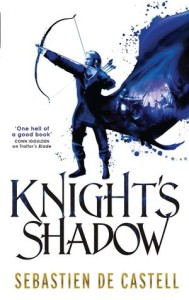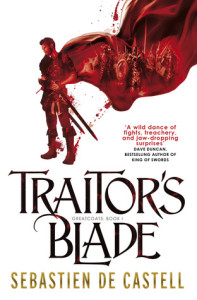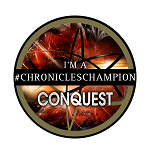Today I am happy to welcome Sebastien De Castell to the blog telling us all about Character Turmoil as the second book in his “Greatcoats” series is released.
Turmoil and Tribulation in Series Fantasy: Why Authors Torment Your Favourite Characters
I slammed down my copy of George R. R. Martin’s Storm of Swords on top of the bed. It bounced. “That son of a—”
“Please stop yelling at the book,” my wife said, nose-deep in a different, less contentious novel. “The author can’t hear you.”
“He’s killed off another of my favourite characters,” I complained.
“Yes, well, that’s terrible of him.”
I took in a deep breath—a necessary preparation for the lengthy speech I was about to deliver—“What’s worse, I didn’t even like that character in the first place! But then damned George R.R. Martin went and made me like the character and then boom! Killed ‘em off right in front of me.”
I imagine some variation of my rant has been repeated by fans of A Song Of Ice and Fire the world over, always ending with the same question: why do authors insist on tormenting and even murdering our favourite characters?
The Need for Escalating Failures
Think of some of your favourite literary characters. What is it about them that you love? I don’t mean the simple, surface attributes like being witty or clever or attractive. I mean the things that will keep you reading page after page to find out what happens to them. Is it their willingness to sacrifice everything for love? Their ability to stand up to even the worst bullies? Whatever those qualities are, chances are they can only really be seen when the character is facing serious adversity.
But can a character who never fails really be brave or determined? How can we find a character’s inner strength compelling unless we’ve first seen them fail? Falcio val Mond, the protagonist of Traitor’s Blade, starts the novel having already failed many of the most important people in his life. His determination to follow his ideals is only interesting because of the way those ideals have failed him in the past. It’s only through watching the character lose—and lose big–that we can rejoice when he finally succeeds.
But what happens after that final victory when we move onto the next book in the series? Will you, as a reader, really be as emotionally engaged if the next failure the protagonist experiences is no worse than the ones you’ve already seen them overcome in the previous book? The answer, of course, is no. And this means that things have to get harder. The emotional stakes have to get bigger, and the failures have to get worse.
The Need for Increasing Torment
The only people who enjoy tormenting the things they love are psychopaths and writers. In fact, the term ‘enjoy’ is probably a bit off here. I suppose it’s more that the writer feels they have a duty to torment their characters. Now that I think of it, I’m not sure if this makes writers better or worse than psychopaths…
There’s a long sequence of scenes that take place in Knight’s Shadow which will, I suspect, shock a few people. I didn’t write them to be shocking, it’s just that, well, that’s how they turned out. See, if you like Falcio as a character then it’s at least in part because you feel a connection to his ideals. But at the root of ideals are real experiences—often terrible ones—that shape our ideas about the world. To get to the absolute core of Falcio, I needed to strip him down to the point where there was nothing left except that first, fundamental piece of him that couldn’t be taken away.
So while failures are a crucial part of the plot, torment—the internal pain that comes as a result of those failures—is vital for character. This, too, becomes more difficult with a sequel. If your beloved character has emerged from his first adventures stronger than before, then the internal pain they experience has to be commensurately higher the next time around.
The Necessity of Death
So after all that, why in the world would any author kill off a character that fans enjoy? Considering how much work it takes to make people like them in the first place, why would any writer do such a foolish thing?
The simple answer is that, at a certain point, a character has finished their journey. They no longer have a tale of their own to tell, they no longer reveal anything about the world they inhabit, and their continued presence dilutes the overall story. At that point the author is faced with a question: should I simply disappear this character (have them move, retire, or otherwise leave the stage)? Or do they have the ability to dramatically impact other characters who do have a story to tell? If it’s the latter, then some radical shift is likely required, either through death or turning towards a darker side.
As a writer, part of my job is to wring every possible ounce of dramatic potential from my characters. If that comes from them living, great. If it comes from them dying…bring on the guillotine!
Addendum: The Necessity of Life
“So that’s why I’m going to kill him off,” I told my editor, the esteemed Jo Fletcher.
She thought about it for all of a second. “No, you damn well aren’t.”
Okay, she didn’t say it exactly that way. In fact, she never actually forbids me from killing off a character, but she has moved me away from killing off specific characters at various points in the series. The details of the conversations change but the essential question is always the same: “Have you said everything you want to say with that character?”
That, kind readers, is the one and only reason to keep a character alive: when they still have important things to say.
Thank you so much!
Review:
Publication Date: Available Now from Jo Fletcher.
Source: Publisher Review Copy
Tristia is a nation overcome by intrigue and corruption. The idealistic young King Paelis is dead and the Greatcoats – legendary travelling magistrates who brought justice to the Kingdom – have been branded as traitors. But just before his head was impaled on a spike, the King swore each of his hundred and forty-four Greatcoats to a different mission.
Falcio Val Mond, First Cantor, with the help of fellow Greatcoats Kest and Brasti, has completed his King’s final task: he has found his Charoites – well, one at least, and she was not quite what they expected. Now they must protect the girl from the many who would see her dead, and place her on the throne of a lawless kingdom. That would be simple enough, if it weren’t for the Daishini, an equally legendary band of assassins, getting in their way, not to forget the Dukes who are determined to hold on to their fractured Kingdoms, or the fact that the heir to the throne is only thirteen years old. Oh, and the poison that is slowly killing Falcio. That’s not even mentioning the Greatcoat’s Lament…
So a big task for the author then, to follow up the really most excellent Traitors Blade with another blazing adventure – if anything Knights Shadow is even more compelling, definitely a whole load of swashbuckling fun but with a darker tone to it that I adored.
Once again it is brilliantly readable, wittily ironic in places with some tremendously clever world building and characterisation – one of the things that I like most about it is the bounce to the dialogue, the interactions between our group of Greatcoats and the wider cast they come across is gorgeously written, often funny and really brings the whole thing to life. Our villains are truly villainous and beautifully drawn, the mythology is expanded and intensified, added to that we have plenty of action, thrills and spills to keep us on our toes.
Knights Shadow picks up right where Traitors Blade left off and is a breathless rollercoaster of a ride that will engage, fascinate and compel the reader ever onwards, there is a beauty to the tale that gets right to the heart of you. Another huge page turner and basically Mr De Castell has just hit the sweet spot when it comes to Fantasy writing – this is exactly how it should be done. No problem with “2nd book syndrome” here, a really really great read. I simply can’t wait for the next.
Find out more here: http://decastell.com/
Follow the author on Twitter here: https://twitter.com/decastell
Purchase Information: https://www.waterstones.com/book/knights-shadow/sebastien-de-castell/9781782066774
Also Available: Read First
Falcio is the first Cantor of the Greatcoats. Trained in the fighting arts and the laws of Tristia, the Greatcoats are travelling Magisters upholding King’s Law. They are heroes. Or at least they were, until they stood aside while the Dukes took the kingdom, and impaled their King’s head on a spike.
Now Tristia is on the verge of collapse and the barbarians are sniffing at the borders. The Dukes bring chaos to the land, while the Greatcoats are scattered far and wide, reviled as traitors, their legendary coats in tatters.
All they have left are the promises they made to King Paelis, to carry out one final mission. But if they have any hope of fulfilling the King’s dream, the divided Greatcoats must reunite, or they will also have to stand aside as they watch their world burn…
https://www.waterstones.com/book/traitors-blade/sebastien-de-castell/9781782066750
Happy Reading Folks!








